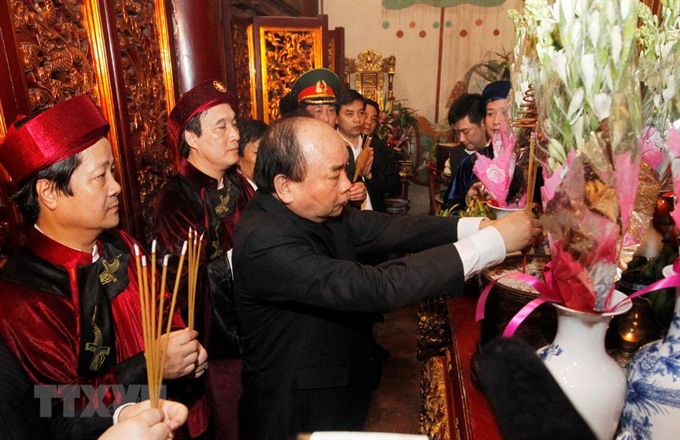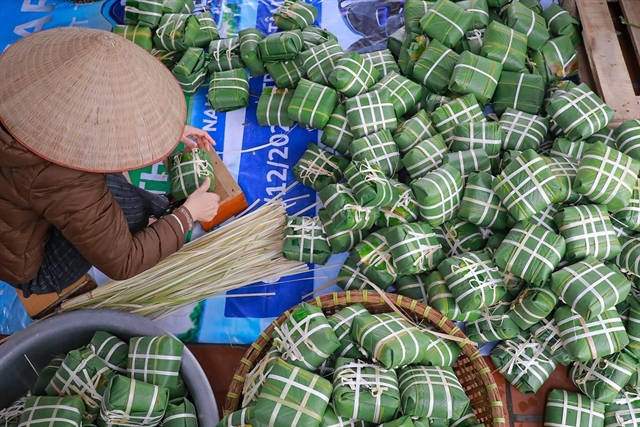 Life & Style
Life & Style

An incense offering ceremony was held at the Hùng Kings Temple Relic Site on Nghĩa Lĩnh Mountain in the northern province of Phú Thọ yesterday, or the tenth day of the third lunar month, to commemorate the national founders, the Hùng Kings.
 |
| PM Phúc and delegates laid wreaths and offered incense and flowers in tribute to the Hùng Kings and other ancestors at the main temple. — VNA/VNS Photo Lâm Khánh |
PHÚ THỌ – An incense offering ceremony was held at the Hùng Kings Temple Relic Site on Nghĩa Lĩnh Mountain in the northern province of Phú Thọ yesterday, or the tenth day of the third lunar month, to commemorate the national founders, the Hùng Kings.
Prime Minister Nguyễn Xuân Phúc, head of the Party Central Committee’s Economic Commission Nguyễn Văn Bình, representatives of ministries and agencies, and provincial leaders attended the ceremony.
PM Phúc and delegates laid wreaths and offered incense and flowers in tribute to the Hùng Kings and other ancestors at the main temple.
They also offered incense at the tomb of the 6th Hùng King and paid tribute to late President Hồ Chí Minh and martyrs at the relief featuring the late leader’s talk with soldiers from the Tiền Phong Vanguard Division stationed at the complex.
Following the incense-offering ceremony, millions of Vietnamese people across the country and abroad paid homage to the national founders at the temple complex.
The same day, provinces and cities nationwide held a wide range of activities in commemoration of the Hùng Kings.
Ruling the country through 18 generations (2879–258 BC), the Hùng Kings taught locals how to grow wet rice. They chose Nghĩa Lĩnh Mountain, the highest in the region, to perform rituals devoted to rice and sun deities to pray for lush crops.
The worshipping rituals of the Hùng Kings are closely related to the ancestral worship traditions of most Vietnamese, an important part of their spiritual life. It was recognised as a UNESCO Intangible Cultural Heritage of Humanity in 2012.
Việt Trì City, which was in the vicinity of the first capital of the country under the Văn Lang administration, still hosts many archaeological and historical relics related to the Hùng Kings’ reign.
Great Việt
Earlier on Tuesday a grand ceremony was held in Hoa Lư District in the northern province of Ninh Bình, to celebrate 1,050 years of the establishment of Đại Cồ Việt, the first centralized feudal state of Việt Nam.
The event, held at the relic site of former imperial capital Hoa Lư in Trương Yên Commune, saw the presence of Party General Secretary Nguyễn Phú Trọng, former Party General Secretary Nông Đức Mạnh, former President Trương Tấn Sang, former Chairman of the National Assembly Nguyễn Sinh Hùng, Deputy Prime Minister Trương Hòa Bình, along with local people and visitors.
In 968, Đinh Bộ Lĩnh put down the anarchy of the 12 warlords to become king under the name Đinh Tiên Hoàng. He named the country Đại Cồ Việt (Great Việt) and set up the capital in Hoa Lư, which is now modern-day Ninh Bình.
The establishment of the first centralized feudal state heralded a new era for the country after a millennium under the rule of dynasties from the north.
The country’s name remained from 968 to 1054 under three dynasties: the Đinh, the Tiền Lê (Early Lê), and the early period of the Lý. In the Tiền Lê Dynasty and the early period of the Lý Dynasty, Đại Cồ Việt continued to develop in all aspects, and the country’s independence and autonomy continued to be reinforced.
Speaking at the ceremony, Deputy Prime Minister Bình said the province is a land of patriotism and culture.
Over the past few years, the province has promoted solidarity and creativity to gain significant achievements in diverse fields with economic growth higher than the average level of the whole country.
With its long-standing and proud history, the Deputy PM believed that Ninh Bình will overcome difficulties to successfully develop. — VNS




